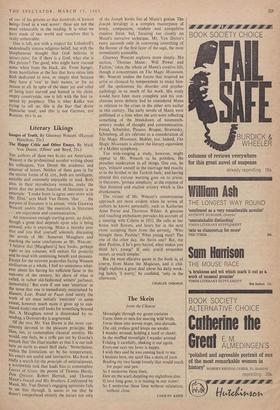Literary Likings
THE authors of these two beaks are Americans. Wescott is the professional novelist writing about his colleagues, Van Doren the academic and amateur of letters. Neither of them goes in for the stricter forms of lit. crit., both are intelligent, amiable and extremely enjoyable to read. Both also, in their introductory remarks, make the point that the prime function of literature is to entertain: 'I make haste to agree once more with Mr. Eliot,' says Mark Van Doren, 'that . . . the purpose of literature is to amuse,' while Glenway Wescott asserts that 'the essentials in literature are enjoyment and communication.'
An innocuous enough starting-point, no doubt, though a great deal depends upon who is being amused, who is enjoying. Make a mistake over that and you find yourself solemnly discussing the novels of Mr. Somerset Maugham and reaching the same conclusions as Mr. Wescott: 'I believe that [Maugham's] best books, perhaps eight or ten volumes, will endure for posterity and be read with continuing benefit and pleasure. Except for the extreme jeopardies facing Western civilisation as a whole, I feel no uneasiness what- ever about his having his sufficient fame in the outcome of the century, his share of what is called, in rather old-fashioned writers' parlance, immortality.' But even if one uses 'entertain' in the sense that one is immediately entertained by Hamlet, Lear, Brand or Faust (and surely the work of art must initially `entertain' to some extent, however much more it gives up to con- tinued study) one still looks for something beyond this. A Maugham novel is diminished by re- reading, a Dostoievsky is augmented. Of the two, Mr. Van Doren is the more con- sistently devoted to the pleasure principle. He likes, too, to contemplate classical serenity. He would, one feels, be a trifle put out by Goethe's remark that 'the Iliad teaches us that it is our task here on earth to enact Hell daily.' Nevertheless, within the limitations set by his temperament, his essays are useful and instructive. His book is really a search for the principle of entertainment, a worthwhile task that leads him to contemplate Leaves of Grass, the poems of Thomas Hardy, Don Quixote, Robert Herrick, and Thomas Mann's Joseph and His Brothers. Confronted by Mann, Mr. Van Doren's engaging optimism fails to see him through. It seems to me that he doesn't comprehend entirely the nature not only of the Joseph books but of Mann's genius. The Joseph tetralogy is a complex masterpiece of irony, compassion, wisdom . and compulsive creative force, but, focusing too closely on Mann's narrative technique, Mr. Van Doren's essay succeeds only in conveying something of the flavour of the first layer of the saga, the most immediately accessible.
Glenway Wescott explores more deeply. His section, 'Thomas Mann: Will Power and Fiction,' takes the whole of Mann's creative life, though it concentrates on The Magic Mountain. Mr. Wescott studies the forces that inspired an artist so classical by temperament to make him- self the spokesman for disorder and psycho- pathology in so much of his work. His study would have been more complete and his con- clusions more definite had he considered Mann in relation to the crises in the other arts earlier in this century. The, early novels of Mann were published at a time when the arts were reflecting something of the breakdown of nineteenth- century modes of thought and communication. Freud, Schnitzler, Picasso, Braque, Stravinsky, Schonberg, all are relevant to a consideration of The Magic Mountain. Mahler, too. Indeed, The Magic Mountain is almost the literary equivalent of a Mahler symphony.
Too wide-ranging a study, however, might appear to Mr. Wescott to be pointless. He preaches moderation in all things. One can, he says, 'exhaust oneself in the marriage bed exactly as in the brothel or the Turkish bath,' and having uttered this curious warning goes on to praise, in literature, 'prosaic simplicity' at the expense of 'that frenzied and exalted artistry which is like drunkenness.
The virtues of Mr. Wescott's commonsense approach are more evident when he writes of authors he knows personally, such as Katherine Anne Porter and Thornton Wilder. A genuine and touching enthusiasm pervades his account of a meeting with Colette in 1952. He calls at her house with flowers, and hears her in the next room accepting them from the servant; 'Who brought them, Pauline? What young man? The one of the other day, the Swiss one? But, my dear Pauline, if he's grey-haired, what makes you think he's young? If only you'd remember names, so much simpler.'
But the most effective quote in the book is, of course, from Mann the Magician, and it chil- lingly explains a great deal about his daily work- ing habits. 'I worry,' he confided, 'only in the afternoon.'
CHARLES OSBORNE


































 Previous page
Previous page